 Life & Style
Life & Style

Traditional spring festivals opened across the country before the decision signed on Friday by Deputy Minister of Culture, Sports and Tourism Trịnh Thị Thủy to postpone, cancel or scale back many events.
HA NOI While many upcoming festivals have been postponed or cancelled due to the coronavirus outbreak, festive cheer has still been abundant in Viet Nam in recent days.
Traditional spring festivals opened across the country before the decision signed yesterday by Deputy Minister of Culture, Sports and Tourism Trịnh Thị Thủy to postpone, cancel or scale back many events.
More than 40,000 people have flocked to Hương Pagoda in Ha Noi's Mỹ Đức District from January 29, which will continue despite the cancellation of other events, including Cướp Phết, or 'Compete for Lucky Ball Festival', in the northern province of Phú Thọ.
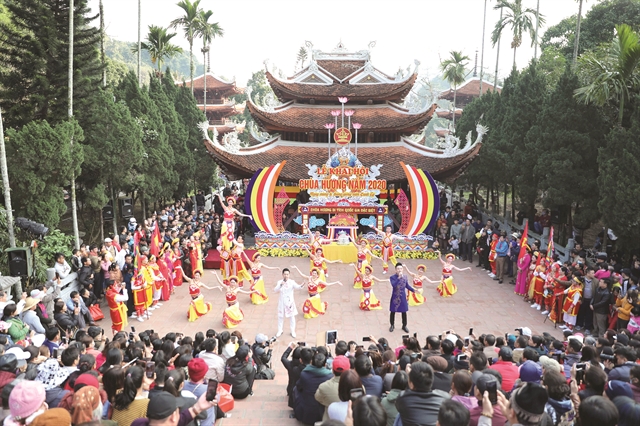
|
| Hương Pagoda Festival , one of the most crowded pilgrim festival in spring in the north. VNA/VNS Photo Thanh Tùng |
Nguyễn Văn Hậu, deputy chairman of Mỹ Đức District’s People’s Committee and head of Hương Pagoda Organising Board, confirmed that authorities prepared solutions to ensure security and safety for tourists.
Hundreds of policemen have been assigned to work at the site in the early festival period. The festival will run till the end of the third lunar month.
According to Hậu, boats have been equipped with lifejackets for passengers. However, authorities reported illegal gambling still happened at the site despite frequent examinations by policemen.
Less competition at festivals
Fighting for lucky offerings leading to violence at Gióng Festival in Sóc Temple in Sóc Sơn District, Hà Nội, was absent from this year's edition on January 30.
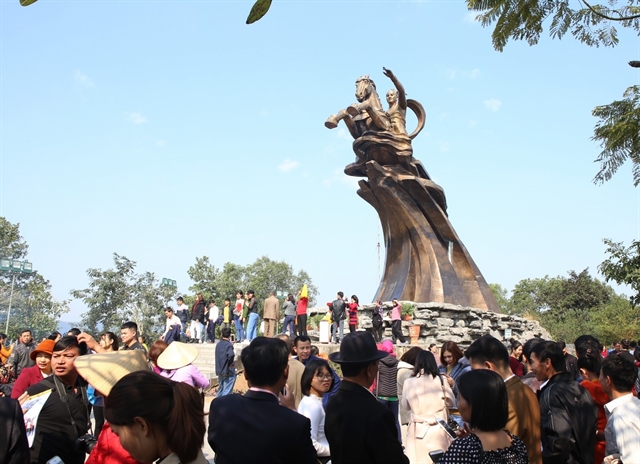
|
| A statue of Saint Gióng, a lengedary hero, who fought against northern invaders under Hùng Vương era (2879-258BC), at Sóc Temple in Sóc Sơn District, Hà Nội. VNA/VNS Photo Danh Lam |
For the past three years, the organisers of the Gióng Festival have excluded the custom of competing for lucky offerings among locals and tourists. Offerings donated to Saint Gióng were then divided among locals and tourists so no one has to fight.
People believe that grabbing some of the offerings at the festival will bring luck.
Besides crowded festivals like Hương Pagoda and Gióng Festival, Hà Nội still hosts more peaceful festivals like Cổ Loa Village Festival (January 30) with a solemn worship ceremony and palanquin procession around a local ancient holy well.
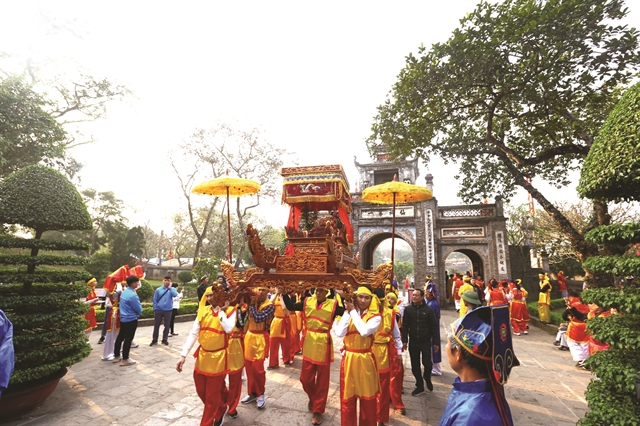
|
| A palanquin procession at Cổ Loa Festival in Đông Anh District, Hà Nội. VNA/VNS Photo Minh Quyết |
Two Trưng Sisters Temple Festival in Mê Linh District has gathered thousands of participants but no chaos has been reported
This year’s festival on January 30 celebrates the 1,980th anniversary of the uprising against the Chinese invaders by the two Trưng sisters. Addressing the festival on January 30, Vice President Đặng Thị Ngọc Thịnh noted that the two Trưng sisters’ uprising in AD 40-43 left a spiritual heritage and priceless lesson on solidarity, uniting people and fighting spirit among Vietnamese people.
Thúy Lĩnh Ball Catching Festival in Hoàng Mai District also took place in a cheerful atmosphere with fighting and competing for prizes on January 30.
Ninh Thị Thu Hương, an official from the Ministry of Culture, Sports and Tourism reported to the ministry’s leaders that all traditional festivals have been organised safely and at low cost.
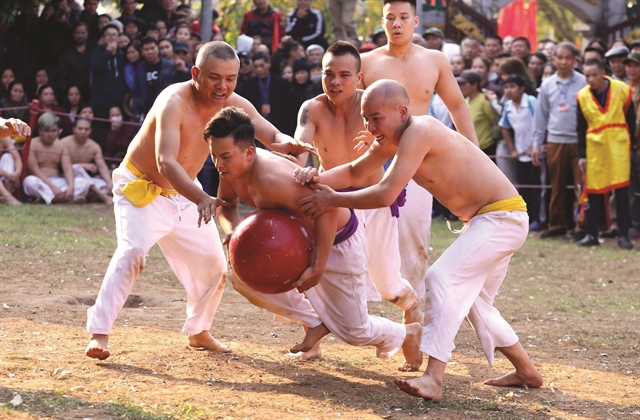
|
| Men compete for the lucky ball at Thúy Lĩnh Ball Catching Festival in Hoàng Mai District, Hà Nội. VNA/VNS Photo Anh Tuấn |
Wrestling festival praising martial arts spirit
Thousands of people attended a traditional wrestling event in Thủ Lễ Communal House, Thủ Lễ Village, Quảng Phước Commune, Quảng Điền District, in the central province of Thừa Thiên - Huế, also on January 30.
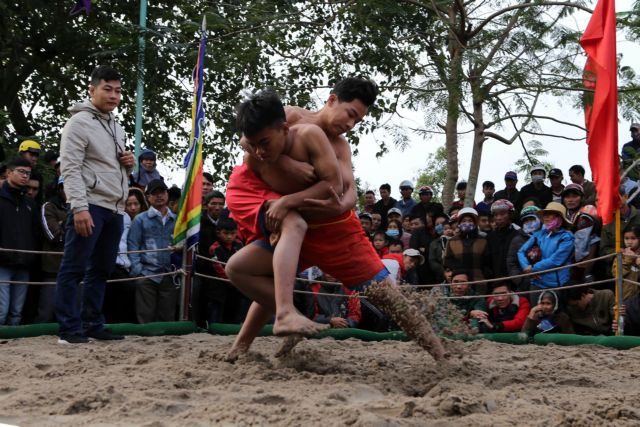
|
| The annual wrestling event in Thủ Lễ Village, Quảng Phước Commune, Quảng Điền District, in the central province of Thừa Thiên - Huế, aims to honour the spirit of martial arts. VNA/VNS Photo Hồ Cầu |
This year’s event gathered 100 male and female wrestlers. Veteran wrestlers and professionals opened the event and were followed by junior wrestlers and amateurs.
The annual event aims to honour the spirit of martial arts and allows anyone in good health to take part.
According to local elders, Thủ lễ wrestling festival started under the Nguyễn Lord era (from the 16th century to 1777) to recruit strong young men for the royal army.
In the past, the event was only for locals, but now wrestlers from other localities can join.
The event also aims to wish for a peaceful nation and prosperous people as well as solidarity among locals.
The event has also helped select wrestlers for national and international sporting events.
Thủ Lễ Communal House dates back to the Nguyễn Lord era and has been recognised as a national-level architecture relic site. VNS